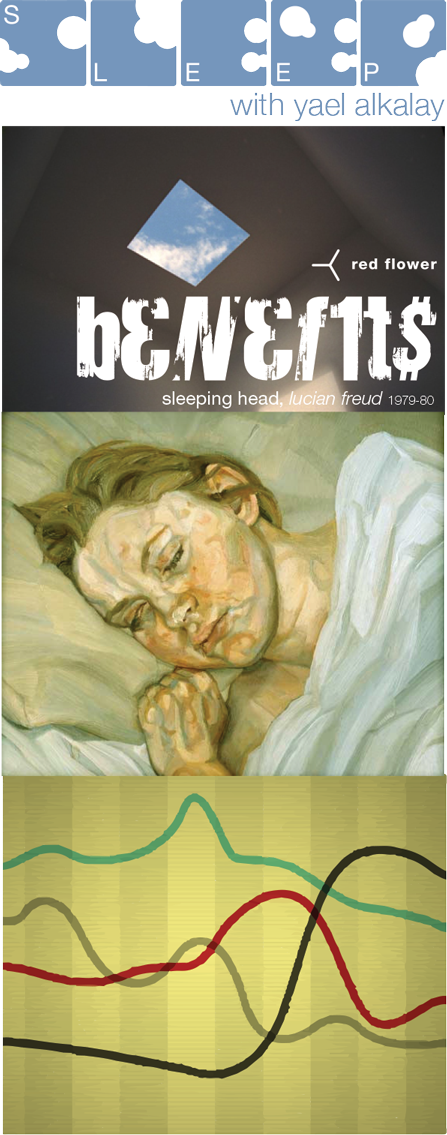
For some, it is a nightly ritual, a welcoming respite, embraced at the end of each day. For others, it is a rally against the dark and an obstacle to work and play. while sleeping is essential, it is a largely overlooked aspect in the picture of general health.
I have always had difficulty sleeping. as a child, I spent many nights awake looking out the window. in college, during my first job in Japan and right through graduate school -- I used my insomnia to my advantage; pushing minimal hours of sleep and seeking some higher level of productivity. Motherhood then stepped in and sleep became an attitude. I then adopted this outlook just to get through the day. Only now, some nine years later am I am learning to ask the right questions and shifting my attitude around the real value and the ultimate health benefit of sleep. My first question was, what is sleep? My second question was: if sleep is truly something not to brush aside for the weak, and the key to ultimate health potential, then how in the world do I achieve it?Roughly 41 million people in the United States -- nearly a third of all working adults -- get six hours or fewer of sleep a night, according to a recent report from the centers for disease control and prevention. whether it's the American work ethic or a sign that we've all overextended our lives, the fact remains that sleep is a necessity we're willing to sacrifice. while I wore my lack of sleep as a red badge of productivity, research provides critical links between inadequate sleep and a broad range of health problems including colds and flu, obesity, cardiovascular disease, diabetes, and even cancer.
Sleep-wake cycles are determined by circadian rhythms. these are physical, mental and behavioral changes that follow a 24-hour cycle, responding to light and darkness in our environment. Abnormal circadian rhythms often lead to sleep disorders such as insomnia and sleep apnea -- which predispose us to clinical depression. After I got into a fender bender after a late night, I learned compromising sleep is akin to the brain functioning on alcohol. being awake for 17 to 19 hours can impair ability more than being over the drunk-driving limit. Was I walking around drunk and dazed? Slowly seeping goodness from my life? Just as a lack of sleep can impair health, deep sleep can work to repair health and promote healthy immune function, a full night's sleep gives the brain recharge and a glow of youth. The term "beauty sleep"exists for a reason.Dreaming is the only other brain function besides breathing that we can do both consciously and unconsciously. It allows the conscious mind to function in the unconscious realm. Even to the non-scientific mind, it must be necessary at some emotional, psychic and spiritual level -- for our mind to work out our problems for us. Good dreaming contributes to our psychological well-being by warding off depression and supporting a healthy memory. The concept that dreams assist creative problem-solving and memory has been discussed for decades, but research also shows that dreams help us to retain new information. From a power nap to a full night's sleep, it offers the brain a chance to decide what information to retain and what to toss. Our dreams become an amalgam of long-term memories and newly ingested information.
-- robert stickgold
director of the center for sleep and cognition at beth israel deaconess medical center at harvard medical school.
Whatever form of security, whether in the form of an alarm or guard dog -- creating a safe sanctuary is important for promoting deep sleep. I am convinced that people with dogs sleep better. they are our eyes and ears in the quiet of night so we can restfully while they watch and listen. In other traditional cultures, such as Japan, families will sleep in the same room as children until they are 6 or 7, creating a sense of security and togetherness.
Making the mundane into a ritual only requires a small habit shifts, create a sleep space as a room only for sleep: with warm, soft comfortable linens (my favorite are by juliab), pillows (a pinched nerve most often comes from poor bedding) and comfortable attire -- I enjoy soft, flowing, natural fabrics. Finish with an essential mist on the linens and throughout the room - the most effective are rich in 100% pure rose oil. Rose provides relief from stress, lowers the breathing rate, blood pressure and anxiety.
Under the advice of Rubin Naiman, sleep expert, evaluate what's on your nightstand. "if sleep is a nightly getaway, then the nightstand is the overnight bag we carry at our side." often our nightstands are riddled with distractions -- glowing alarm clocks, personal electronics and piles of work. Mine now has fresh flowers, a water glass, pen and paper, a book, plum blossom spray, and essential omega fresh berry-oil serum. dim the lights about an hour before bed. dimming the lights mimics nature's circadian rhythms and allows the brain to begin slowing down. try candlelight (i use candles with lavender oil, a natural sedative) and a warm bath with curative bath salts (preferably with juniper oil). This will help to calm the mind and ease muscle pain and inflammation in the body. an anti-inflammatory, juniper oil has an interesting history ranging from a Native American cure for arthritis to safeguard against nightmares and disease in Scottish folklore. Follow with some slow stretching and deep breathing. The mind should more settled, ready to slow down. Lie in the dark, with a deep exhale, open the eyes to welcome darkness and breathe.Any path to settle the mind is worth trying. settling the mind and making space increases alpha brain waves and prepares the body for deep sleep. Mindful meditation, in any form, is a key step for relaxing the mind and body before sleep. Using the power of restorative touch, i've created a simple evening ritual of doing facial acupressure. Close your eyes and connect the fingers to the pulse points on the face. feel warmth emanate from the fingertips through meridian points in the body for sense of deep relaxation and connectedness.
In seeking a fulfilling form of meditation, I found special inspiration in the bedtime shema. Looking back on your day, you ask and give forgiveness for all the trials and mistakes of the day -- in a simple kind of purification that quiets the mind and helps you to regain control. This purifying act is prevalent in many cultures and religions as part of a nightly ritual. For another simple and direct approach to meditation, meditation specialist and yoga teacher, Elena Brower offers this simple set of exercises.Every morning is a rebirth. take a few seconds before fully opening the eyes to think about who and how you want to be in this new day. A simple adjustment from being reactive to proactive. Then follow with a very hot shower and with a or fresh mint wash to activate the circulatory system and limbic system and energize the day. getting sufficient sleep at night also allows the body to wake naturally without the use of an alarm clock. creating these daily rituals of sleeping and waking and small shifts of habit now allow me to wake feeling present, alive and more myself everyday.
For additional information about healthy sleep & meditation please visit: NPR Pulling Back The Covers On 'Strange Science Of Sleep' dr. rubin naiman bedtime shema elena brower sleep studio canyon ranch cdc sleep study current biology: dreaming of a learning task is associated with enhanced sleep-dependent memory consolidation national sleep foundation
